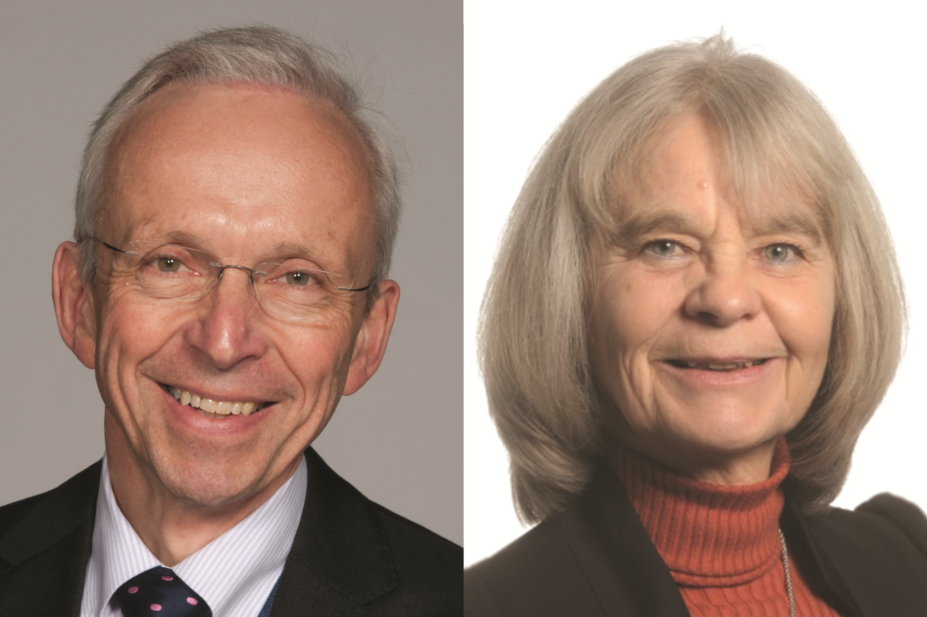
Courtesy of Peter Kopelman and Christine Bond
Two new expert boards have been established by the Royal Pharmaceutical Society (RPS). The Faculty and Education board (FEB) will be chaired by Peter Kopelman, former principal of St George’s, University of London. Christine Bond, emeritus professor in primary care at the Institute of Applied Health Sciences at the University of Aberdeen, will chair the new Science and Research board (SRB).
Both boards have evolved from existing expert groups in the RPS. The FEB continues the work of the Faculty board, and the SRB has developed from the Pharmaceutical Science Expert Advisory Panel (PSEAP).
“We felt that there wasn’t, perhaps, sufficient emphasis on the science and research and education element of the RPS in its previous form,” said Kopelman.
“We therefore thought it important to underline the importance of these activities, and the way that these activities should be considered at [RPS] Assembly, by restructuring those committees or boards that previously had an interest in science, research and education; hence the two new boards.”
Kopelman chaired the original Faculty board, and said the new board extends the remit of that group.
“[The FEB is] looking at the whole element of career frameworks and career progression for pharmacists, as well as considering all the other important aspects of pharmacy roles: the extended role of pharmacists in the community, pharmacist in general practice, in emergency departments.
“And, importantly, we are considering and addressing the need for structures to support pharmacists through revalidation,” he explained.
Revalidation is a priority for the FEB as it heads into its first year. The FEB, Kopelman said, is helping to ensure that “there are structures to support the profession as a whole, not simply for members of the RPS — but we do want to show the additional value of being a member of the RPS in terms of submissions, and support and mentorship for revalidation.
“It’s what we’ve termed as ‘revalidation ready’,” he added.
Among other activities, the FEB will be looking more into Foundation programmes. “I’ve been chairing a Task and Finish group that has considered career frameworks and post-registration training programmes for pharmacists. The Task and Finish Group will be making recommendations to the chief pharmaceutical officers of Scotland, Wales, Northern Ireland and England,” Kopelman explained. Advanced practice is another focus — in particular, the additional benefits Faculty membership can offer pharmacists as they progress in their careers.
The FEB will be going out to engage with members, Kopelman said, adding that he considers it “important that there is that dialogue between members and the board”.
Like Kopelman, Bond brings prior experience of leading expert panels having previously chaired the Pharmaceutical Science Expert Advisory Panel (PSEAP). “The SRB comprises pharmaceutical scientists from a range of scientific disciplines,” Bond said. “The board will inform RPS policy and be responsible for setting the strategic direction, and providing oversight, of the delivery of the RPS strategic imperatives around pharmaceutical science, research and evaluation.”
“We have the expertise to support the RPS, and chief scientist, Gino Martini and his team, in developing the RPS Science and Research Strategy to ensure it is relevant to the profession now and in the future,” she said.
Bond said she hoped to see the SRB increase the profile of pharmaceutical science within the RPS, and help to emphasise its relevance to the whole profession.
“Highlighting the importance of pharmaceutical sciences, ranging from basic laboratory science through to the applied health sciences is central to our professional identity,” she said. “Core to this is ensuring the science content of the undergraduate degree is maintained.
“Our pharmacy workforce needs to be able to authoritatively inform the public on new developments in medicine and medicines use, and provide objective advice to other healthcare professionals,” she added.
Bond also highlighted the importance of pharmacists actively undertaking research, and said that there was a need “for all pharmacists to be research-aware and many to be research-active, so they can contribute to building the evidence base.” The SRB, Bond said, will support pharmacists in these research roles.
According to Bond, outputs from the SRB will include member resources on new and emerging issues including personalised medicines, disease modifying therapies, medicines development and use of technologies. The board are also planning thought leadership papers on developments like big data.
Alongside these, the board will inform the work of the RPS in developing professional standards, guidance and professional policy — ensuring that they are based on sound evidence.
The SRB’s first meeting is on 20 February 2018, and the FEB will meet for the first time in March.

